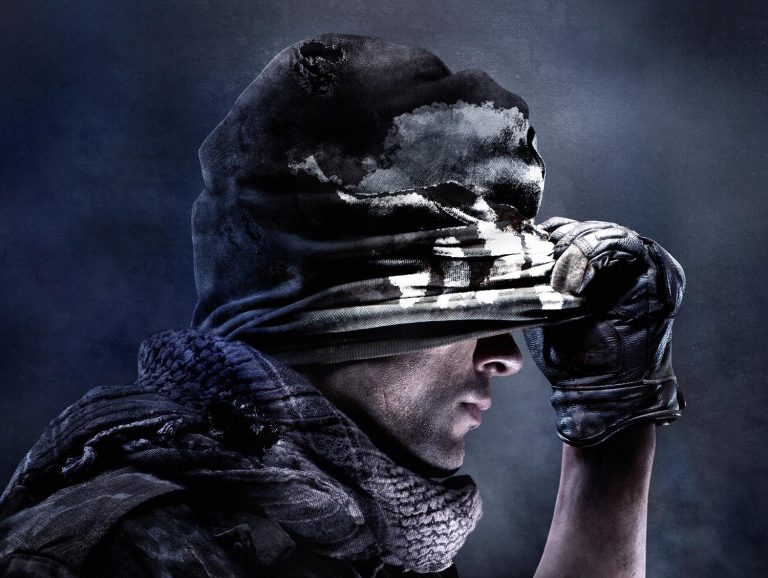Before Activision CEO Eric Hirshberg even took the stage, there was a clear message being sent. Throughout the current console generation it has been hard to find a game with the mainstream dominance as the Call of Duty franchise. The military first-person shooter has not simply been one of the highest grossing games every year for the last five years, it has dominated sales in the waning years of this generation, getting bigger every year while retail software sales diminished. No matter what circle you are in, no matter who you are talking to, there’s a good chance that they have heard of Call of Duty and also a pretty good chance they have played it. Call of Duty fueled a progressive-multiplayer fire that holds millions of players captive each year, and claims mainstream stronghold other publishers dream of.
Up until today, Call of Duty: Ghosts had been shown in an underwhelming capacity. Ever since coming onto the scene during the underwhelming Xbox One announcement, Ghosts had struggled to pitch itself as something more than Call of Duty with dogs. People began to scoff at the demos where developers talked about the “fish AI” and soon jokes like the Call of Duty Dog began to grow. As Xbox One showed signs of weakness coming into the next generation, the franchise synonymous with the console’s success was starting to look equally benign. Call of Duty has been growing like clockwork every year, it was starting to become fair to ask if the success was going to peak with 2021’s Black Ops 2.
However, Wednesday Call of Duty took steps to prove that it has a plan to continue its dominance over the video game industry. During an hour-long live stream, the people from Activision and Infinity Ward showed off what Executive Producer, Mark Rubin called, “…the biggest overhaul of multiplayer we’ve done since the original Modern Warfare”. Call of Duty has been rather iterative over its history, so that statement isn’t completely bombastic, but it does send a message as to what Activision and Infinity Ward’s goal were heading into a new generation.
There appears to be a decent amount of truth in the words of Rubin, Call of Duty finally has more to show for itself than dogs and fish. New dynamic maps, soldier and squad creation, and the ability to take your game on the go are just some of the many features that Ghosts showed off during its stage show. While Call of Duty continues to offer its same (if not more) breathlessly paced tactical combat, it is really looking to give players a deeper and more strategic experience, a criticism often leveled at the game.
The majority of these updates are improvements on already established systems of Call of Duty’s wildly popular multiplayer, which is what makes Infinity Ward’s next move interesting. Instead of simply playing and upgrading a single soldier, the game features squads. These squads allow players to shift between ten different characters, leveling them up and individually customizing them. These squads also can be carried into new game modes where a player controls one soldier of their squad and AI control the others. Rubin promised that the AI in Ghosts would be indecipherable from real players, time will tell on that front. However, competing in a plethora of squad games levels up a player’s squad as a whole and victory can hinge on the type of squadmates selected and their loadouts. It gives a new flavor to the franchise, moving the player into a manager role, rather than a fighter. It is difficult to tell if it will catch on, but it is definitely something different.
Call of Duty gets a consistent amount of unfair hatred from people outside of its wheelhouse, assigning it the “bro” tag before it even hits shelves. Activision doesn’t always do much to shrug off the image, but the game has become so widely popular and has captured such a dedicated fan base that painting it with large generalizations is unfair. There is little difference between people who obsess over the franchise and people who obsess over any other game, just that more people obsess over Call of Duty.
It is nice to see that Activision has stopped resting on its laurels. Ghosts looks like it will live up to Rubin’s promise of a definitively different version of Call of Duty multiplayer, one that will make players think in new ways. The questions can now shift from what Call of Duty is bringing into the next generation to if the players will enjoy the changes? There is an argument to be made that what players want from Call of Duty is comfort in knowing the product released each November is the same as it was the year before. While the settings and the minor details change, the majority stays the same. Ghosts threatens the discomfort of change, and while the new modes could be ignored it is unlikely that all the changes can slip under the radar. A simple tuning of Black Ops 2 inspired hateful messages and death threats, imagine what a multiplayer shake up could inspire.
There is still considerable amount time left between today and Call of Duty: Ghosts’ launch November 5th. The product appears to finally be on the table and it feels like there is at last a spark of life to what had been a floundering campaign, seemingly content to spew out reused ideas. There is uncertainty about what Activision and Infinity Ward are offering, but there is also excitement that Call of Duty could be brewing new ways to keep the populace in their hold. By the end of next generation we may not be talking about the Call of Duty dominance in the same way as we do today, but that doesn’t mean that they are going to give up their title quietly.



0 Comments